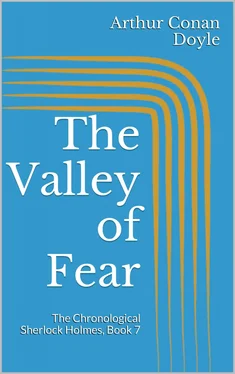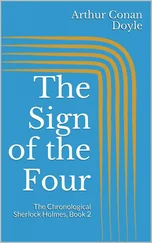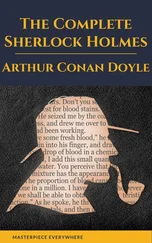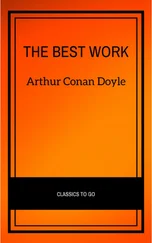“That is very helpful, Mr. Holmes. No doubt you are right. Wonderful! Wonderful! Do you carry the names of all the gun makers in the world in your memory?”
Holmes dismissed the subject with a wave.
“No doubt it is an American shotgun,” White Mason continued. “I seem to have read that a sawed-off shotgun is a weapon used in some parts of America. Apart from the name upon the barrel, the idea had occurred to me. There is some evidence then, that this man who entered the house and killed its master was an American.”
MacDonald shook his head. “Man, you are surely travelling overfast,” said he. “I have heard no evidence yet that any stranger was ever in the house at all.”
“The open window, the blood on the sill, the queer card, the marks of boots in the corner, the gun!”
“Nothing there that could not have been arranged. Mr. Douglas was an American, or had lived long in America. So had Mr. Barker. You don’t need to import an American from outside in order to account for American doings.”
“Ames, the butler—“
“What about him? Is he reliable?”
“Ten years with Sir Charles Chandos—as solid as a rock. He has been with Douglas ever since he took the Manor House five years ago. He has never seen a gun of this sort in the house.”
“The gun was made to conceal. That’s why the barrels were sawed. It would fit into any box. How could he swear there was no such gun in the house?”
“Well, anyhow, he had never seen one.”
MacDonald shook his obstinate Scotch head. “I’m not convinced yet that there was ever anyone in the house,” said he. “I’m asking you to conseedar” (his accent became more Aberdonian as he lost himself in his argument) “I’m asking you to conseedar what it involves if you suppose that this gun was ever brought into the house, and that all these strange things were done by a person from outside. Oh, man, it’s just inconceivable! It’s clean against common sense! I put it to you, Mr. Holmes, judging it by what we have heard.”
“Well, state your case, Mr. Mac,” said Holmes in his most judicial style.
“The man is not a burglar, supposing that he ever existed. The ring business and the card point to premeditated murder for some private reason. Very good. Here is a man who slips into a house with the deliberate intention of committing murder. He knows, if he knows anything, that he will have a deeficulty in making his escape, as the house is surrounded with water. What weapon would he choose? You would say the most silent in the world. Then he could hope when the deed was done to slip quickly from the window, to wade the moat, and to get away at his leisure. That’s understandable. But is it understandable that he should go out of his way to bring with him the most noisy weapon he could select, knowing well that it will fetch every human being in the house to the spot as quick as they can run, and that it is all odds that he will be seen before he can get across the moat? Is that credible, Mr. Holmes?”
“Well, you put the case strongly,” my friend replied thoughtfully. “It certainly needs a good deal of justification. May I ask, Mr. White Mason, whether you examined the farther side of the moat at once to see if there were any signs of the man having climbed out from the water?”
“There were no signs, Mr. Holmes. But it is a stone ledge, and one could hardly expect them.”
“No tracks or marks?”
“None.”
“Ha! Would there be any objection, Mr. White Mason, to our going down to the house at once? There may possibly be some small point which might be suggestive.”
“I was going to propose it, Mr. Holmes; but I thought it well to put you in touch with all the facts before we go. I suppose if anything should strike you—“ White Mason looked doubtfully at the amateur.
“I have worked with Mr. Holmes before,” said Inspector MacDonald. “He plays the game.”
“My own idea of the game, at any rate,” said Holmes, with a smile. “I go into a case to help the ends of justice and the work of the police. If I have ever separated myself from the official force, it is because they have first separated themselves from me. I have no wish ever to score at their expense. At the same time, Mr. White Mason, I claim the right to work in my own way and give my results at my own time—complete rather than in stages.”
“I am sure we are honoured by your presence and to show you all we know,” said White Mason cordially. “Come along, Dr. Watson, and when the time comes we’ll all hope for a place in your book.”
We walked down the quaint village street with a row of pollarded elms on each side of it. Just beyond were two ancient stone pillars, weather-stained and lichen-blotched, bearing upon their summits a shapeless something which had once been the rampant lion of Capus of Birlstone. A short walk along the winding drive with such sward and oaks around it as one only sees in rural England, then a sudden turn, and the long, low Jacobean house of dingy, liver-coloured brick lay before us, with an old-fashioned garden of cut yews on each side of it. As we approached it, there was the wooden drawbridge and the beautiful broad moat as still and luminous as quicksilver in the cold, winter sunshine.
Three centuries had flowed past the old Manor House, centuries of births and of homecomings, of country dances and of the meetings of fox hunters. Strange that now in its old age this dark business should have cast its shadow upon the venerable walls! And yet those strange, peaked roofs and quaint, overhung gables were a fitting covering to grim and terrible intrigue. As I looked at the deep-set windows and the long sweep of the dull-coloured, water-lapped front, I felt that no more fitting scene could be set for such a tragedy.
“That’s the window,” said White Mason, “that one on the immediate right of the drawbridge. It’s open just as it was found last night.”
“It looks rather narrow for a man to pass.”
“Well, it wasn’t a fat man, anyhow. We don’t need your deductions, Mr. Holmes, to tell us that. But you or I could squeeze through all right.”
Holmes walked to the edge of the moat and looked across. Then he examined the stone ledge and the grass border beyond it.
“I’ve had a good look, Mr. Holmes,” said White Mason. “There is nothing there, no sign that anyone has landed—but why should he leave any sign?”
“Exactly. Why should he? Is the water always turbid?”
“Generally about this colour. The stream brings down the clay.”
“How deep is it?”
“About two feet at each side and three in the middle.”
“So we can put aside all idea of the man having been drowned in crossing.”
“No, a child could not be drowned in it.”
We walked across the drawbridge, and were admitted by a quaint, gnarled, dried-up person, who was the butler, Ames. The poor old fellow was white and quivering from the shock. The village sergeant, a tall, formal, melancholy man, still held his vigil in the room of Fate. The doctor had departed.
“Anything fresh, Sergeant Wilson?” asked White Mason.
“No, sir.”
“Then you can go home. You’ve had enough. We can send for you if we want you. The butler had better wait outside. Tell him to warn Mr. Cecil Barker, Mrs. Douglas, and the housekeeper that we may want a word with them presently. Now, gentlemen, perhaps you will allow me to give you the views I have formed first, and then you will be able to arrive at your own.”
He impressed me, this country specialist. He had a solid grip of fact and a cool, clear, common-sense brain, which should take him some way in his profession. Holmes listened to him intently, with no sign of that impatience which the official exponent too often produced.
Читать дальше












